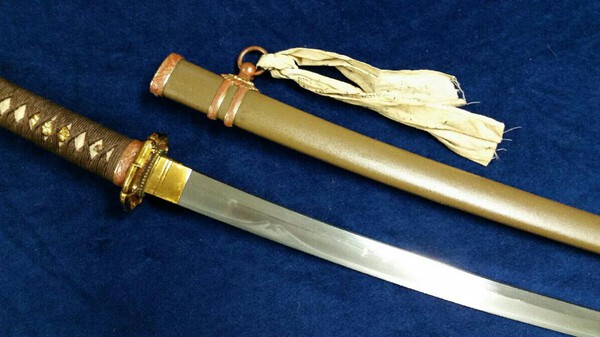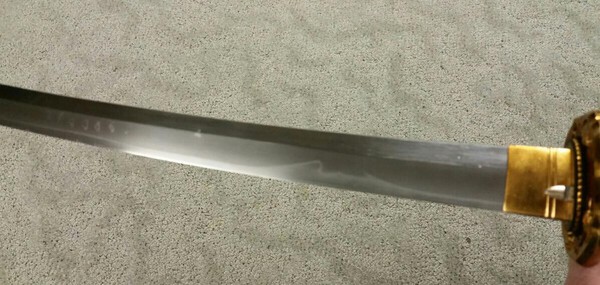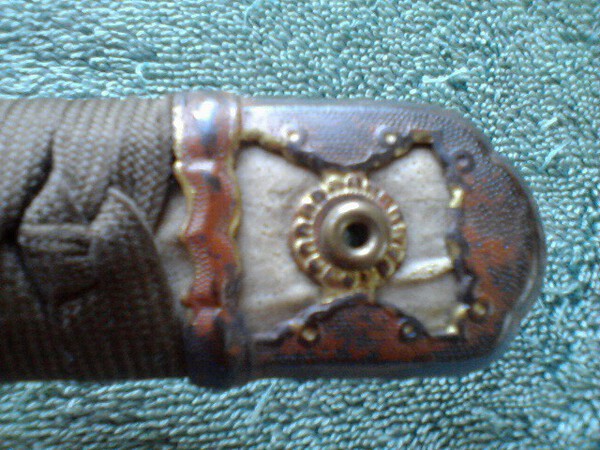-
Posts
1,690 -
Joined
-
Last visited
-
Days Won
11
Content Type
Profiles
Forums
Events
Store
Downloads
Gallery
Everything posted by Dave R
-

What NOT to do.... just a bit of fun
Dave R replied to Brian's topic in General Nihonto Related Discussion
Not odd at all. the long nakago, (full length of the tsuka) is a feature of blades of this era. -

Another Navy Last one No6
Dave R replied to Guns Knives and Swords's topic in Military Swords of Japan
To me, both saya covers, and possibly the saya' look old. Now let's see the blades! Stick them under a new heading if you are bothered. -

Another Navy Last one No6
Dave R replied to Guns Knives and Swords's topic in Military Swords of Japan
What decided you that they were junk. We have seen some very odd pieces here that turned out to be genuine, and some very convincing items that did turn out to be fake/junk. -

Another Navy Last one No6
Dave R replied to Guns Knives and Swords's topic in Military Swords of Japan
Hybrid mounts, if all contemporary I would suggest it was carried by an officer in the Imperial Japanese Naval Landing Force, (often miscalled Marines). The tassel/sword knot could be sun bleached, or the colour literally washed out. ... That Haikan is definitely too high on the saya though! -

Rinji Seishiki Gunto blade length
Dave R replied to george trotter's topic in Military Swords of Japan
Quick question, which Kaneyoshi? I have a blade by Okada Kaneyoshi and it's a noticeably robust blade compared to others I have seen and handled. Made for type 98 mounts. -

Is this Seki Sword factory building still standing?
Dave R replied to george trotter's topic in Military Swords of Japan
The Buddhist temple should still be there, so you have one marker in place. -

Is this Seki Sword factory building still standing?
Dave R replied to george trotter's topic in Military Swords of Japan
From Wikipedia...."Mugi (武儀郡, Mugi-gun) was a district located in Gifu, Japan. The district was dissolved after it was merged into the nearby city of Seki on February 7, 2005.[1]" which might explain one problem anyway. -
Looking at the patina I reckon Sengoku Era, possibly a bundle sword. It's also posted over at Nihonto, nice to see more pic's of of the Koshira here.
-

Navy Officers Sword What do I have No 4
Dave R replied to Guns Knives and Swords's topic in Military Swords of Japan
-

Is this Seki Sword factory building still standing?
Dave R replied to george trotter's topic in Military Swords of Japan
Sadly a lot of towns, not just in Japan were ^redeveloped^ courtesy of enemy air-forces in the mid 1940's, and the following Industrial rebuilding makes one place look much like another. You ought to see Sheffield,... or perhaps not! -
I think we are looking at quite an old blade here, and unsigned, possibly one of those made in the era of civil war in Japan, what we call a Kazu uchi mono, a "bundle sword". It might have been signed and the signature lost when the blade was shortened from the tang end as is normal for Japanese blades. This would make it 400 years old or more. It would be nice to see the scabbard in full, and a good shot of the sword knot. Lots of info' here on sword care, and others more knowledgeable will weigh in as they come online and see your post.
-
Where's the Navy sword with blue Ito?
-

Military Sword What do I have No 5
Dave R replied to Guns Knives and Swords's topic in Military Swords of Japan
The late war "contingency specification" pattern, officially approved and regulated but they can be very varied in materials used and quality of craftsmanship. The mounts are supposed to be all iron/steel but copper alloy mounts, like the tsuba on yours appear quite frequently. Generally metal scabbards are associated with factory made blades, and lacquered wood with traditional nihonto blades. Use Rinji Seishiki as your search term. -
-

What NOT to do.... just a bit of fun
Dave R replied to Brian's topic in General Nihonto Related Discussion
OK, I'll play. The mounts are typical field mounts for WW2, somewhat patinated, possibly kept out of the light and slightly damp. The Ito is good, but probably tender, I would like a better look at the end knots. It has been taken apart and not reassembled properly. I am looking forward to better pic's of the tsuba and leather tab. The saya cover is one of the "removable" type so it might be a trad' saya underneath, but the kurikata removed. Going by the habaki, the blade was originally in Buke Zukuri mounts, so the blade could be old... or one of those early Showa swords that could be either traditional or Showato. By UK prices you go it at a decent price..... after doing the $-£, conversion, you got it cheap! -

Officers Sword What do I have No 3
Dave R replied to Guns Knives and Swords's topic in Military Swords of Japan
A very nice sword, and I would say a type 94 as well. The separate sarute barrel being the clincher for me. The way the signature is cut has me wondering about a non traditional blade.Some very high class officers went for practicality rather than art! -

Tanto What do I have here?
Dave R replied to Guns Knives and Swords's topic in General Nihonto Related Discussion
In which case the tosugo will have been purpose made as part of the package! -

Tanto What do I have here?
Dave R replied to Guns Knives and Swords's topic in General Nihonto Related Discussion
In a thread this long I may have missed something but, surely the bigger problem of adding another item to the mount, would be cutting the slot/aperture in the wood and lacquer of the Saya, and then removing all signs of the new work. A new made for purpose saya would be the easier option in fact. -
I bought mine from here. Fairly easy to deal with, they take paypal and you get the real thing at a decent price. https://www.namikawa-ltd.com/product/164
-

Rinji Seishiki Gunto blade length
Dave R replied to george trotter's topic in Military Swords of Japan
One example of an old blade in Rinji mounts from http://ohmura-study.net/753.html I suspect that the shorter nakago on the older blades was an issue. -
I wince every time I see those active red rust patches.
-
This is what a late war type 98 kabutogane looks like. It's actually plated iron/steel so it is very late. For me the clincher in the original post was the sharp edge/corner between the sides and the profile rather than the smooth transition on the originals. One or two anomalies are passable, but a build up of small faults are the killer.
-

Showato inheritance, very little information
Dave R replied to TroyTF's topic in Military Swords of Japan
I think a new "Nakago" has been welded on to keep the blade length as it was. I have seen this done with a rat tail tang blade to make it "usable". We need to know more of the swords history to make sense of it. -

Showato inheritance, very little information
Dave R replied to TroyTF's topic in Military Swords of Japan
We really need to see beneath the habaki, I have in the past seen a a genuine signed nakago joined to a spurious blade with the join hidden by an immovable habaki......














